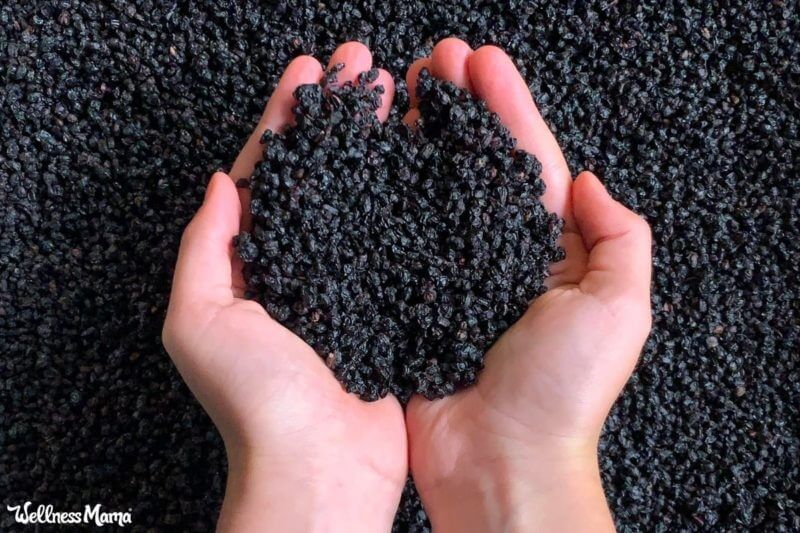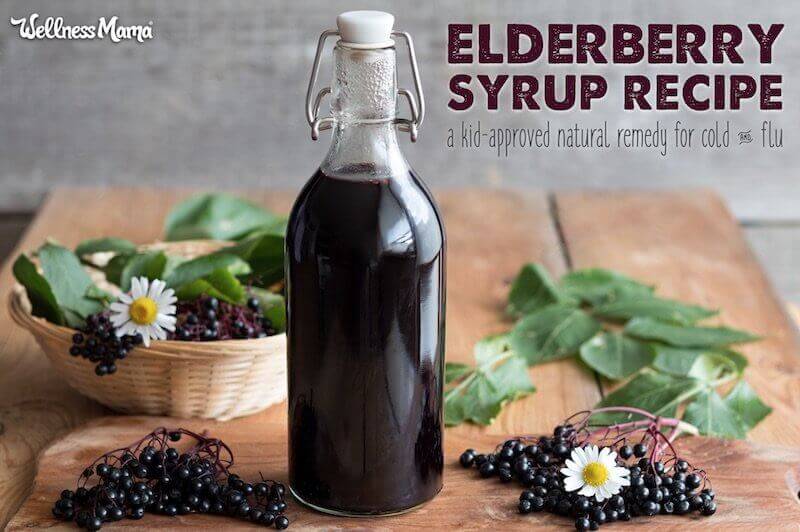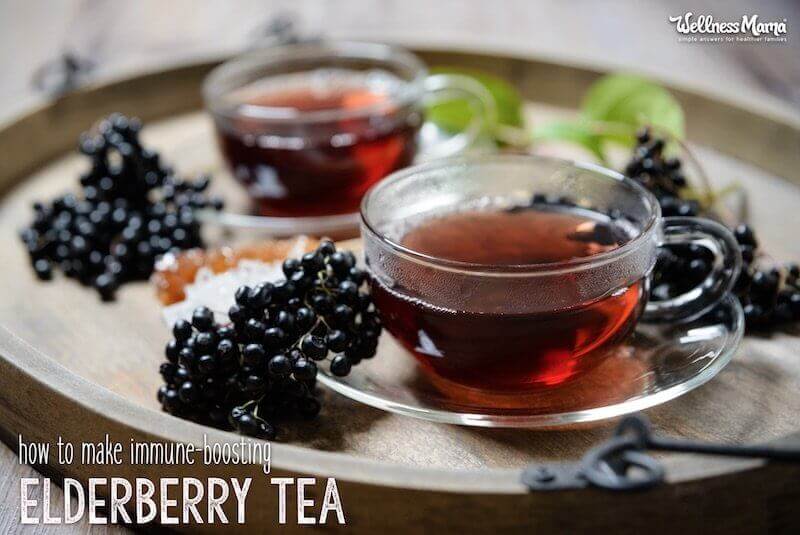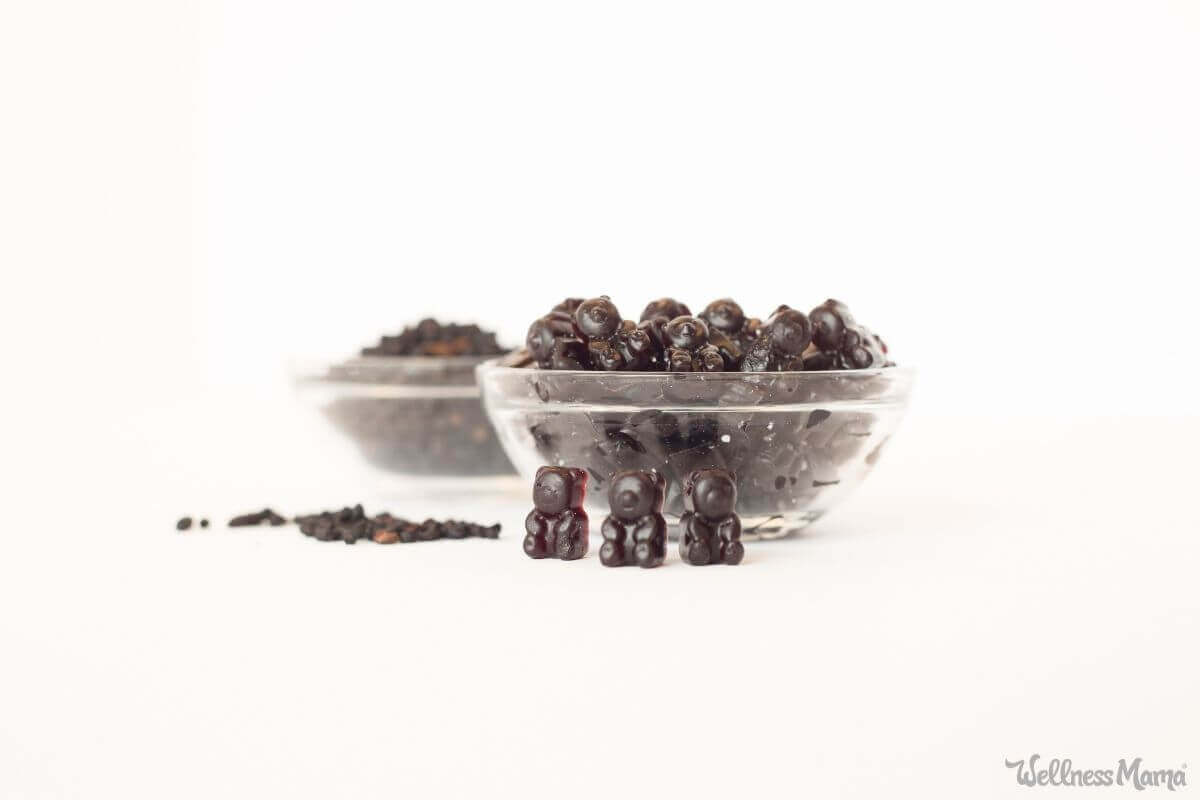
I’ve written before about using elderberries to help defend against the seasonal flu. Black elderberries are native to Europe and have a long history of use in herbal medicine. The berries of the plant are often used for preserves, syrups, and tinctures, while the bark and flowers are also useful and sometimes made into tea.
It’s easy for me to sing the praises of elderberry since this is our family’s first line of defense against the flu, and we haven’t gotten it in several years!
These are the ones I purchase and one pound can last over a year even when we are all taking elderberry syrup regularly!
What Are Elderberries?
Black elderberries are small, dark purple berries common in parts of North America and Central Europe. Elderberries can be used in jellies, pies, or baked goods much like any berry. They can also be dried and made into teas, tinctures, and syrups. They aren’t popular so much for their flavor (although they do taste good!) but for their powerful medicinal properties.
Several studies (like this one) show that elderberry syrup administered at the first sign of illness seems to shorten the severity and length of colds and flu. Its effectiveness is probably thanks to elderberry’s high levels of vitamins A and C, as well as a flavonoid and antioxidant profile that outranks other berries.
A Natural Remedy for Mild Colds and Flu?
If you or your child has ever had a rough case of the common cold or the flu, you know how miserable it can be. Especially for moms, it is awful to see your children feeling so bad and not be able to fix it. Thankfully, nature provides some remedies that can help avoid minor illnesses and shorten the duration if you do get them.
Elderberries (technically Sambucus nigra) naturally contain vitamins A, B, and C. Israeli researchers found that the complex sugars in elderberries support the immune system in fighting cold and flu. They developed several formulas based on these complex sugars that have been clinically shown to help ameliorate all kinds of cold/flu.
Extensive research shows why elderberry is so popular as an immune-supporting natural remedy:
Dr. Madeleine Mumcuoglu, of Hadassah-Hebrew University in Israel found that elderberry disarms the enzyme viruses use to penetrate healthy cells in the lining of the nose and throat. Taken before infection, it prevents infection. Taken after infection, it prevents spread of the virus through the respiratory tract. In a clinical trial, 20% of study subjects reported significant improvement within 24 hours, 70% by 48 hours, and 90% claimed complete cure in three days. In contrast, subjects receiving the placebo required 6 days to recover.” (Journal of Complementary & Alternative Medicine 1995)
Even WebMD acknowledges elderberry’s use in medicine:
Elderberry is used for “the flu” (influenza), H1N1 “swine” flu, HIV/AIDS, and boosting the immune system. It is also used for sinus pain, back and leg pain (sciatica), nerve pain (neuralgia), and chronic fatigue syndrome (CFS).
Some people use elderberry for hay fever (allergic rhinitis), cancer, as a laxative, for constipation, to increase urine flow, and to cause sweating.
Of course, elderberries or other herbs are not a substitute for medical treatment when needed. As always, check with a doctor or health care professional for any illness or before using any remedy.
How to Use Elderberries (+ Recipes)
With all these benefits, we use elderberries a lot around here! There are plenty of easy ways to make natural cold and flu-fighting remedies from elderberries for the whole family.
Some of our favorite recipes are:
- Elderberry Syrup – Homemade Elderberry syrup is much less expensive than the pre-made version (and just as effective) in my experience. My popular recipe for homemade elderberry syrup is below. It tastes a little like concentrated grape juice with a touch of cinnamon. You (and your kids) will love it! (p.s. This syrup is also good on homemade pancakes!)
- In Baking – Dried elderberries can also be added to muffins or pancakes for a berry flavor similar to blueberries but not quite as sweet.
- As a Tea – Dried elderberries or elder flowers can be used to make a delicious elderberry tea (I’d add honey or stevia since it is somewhat sour).
- Flu-Busting Gummy Bears – Kids won’t even know these tasty gummies are really a cold and flu remedy.
- Elderberry Marshmallows – I’m ok with “a spoonful of sugar to make the medicine go down” in this case. These marshmallows are sweetened with natural honey and contain gelatin, ginger, and other ingredients known to boost the immune system.
- Fizzy Elderberry Kombucha Soda – Please their palate and their gut at the same time with this healthy soda alternative!
- Elderberry Popsicles – These popsicles are the perfect choice to soothe sore throats.
I definitely recommend buying your elderberries early in the season, as they’ve grown in popularity so much over the years that they always tend to sell out when you need them the most.
Stock up early for winter and the flu and cold season!
Where to Buy Elderberries
I always encourage anyone to research and talk to an herbalist before using any wildcrafted herb to make sure that the correct herb is being used in a safe way.
Elderberries are common in forests and wooded areas in parts of the U.S., but please don’t try gathering them without an expert! There are plants that resemble elderberries that are not safe to eat (or drink). The berries also must be properly dried and separated from the leaves and stems or they can cause digestive problems.
Rather than forage in the woods for my ingredients, I order organic dried elderberries in bulk since they are much less expensive (and safer) this way. I store them in our deep freezer between uses and they last for years, especially if we — hopefully — stay healthy!

Wellness Mama Elderberry Syrup Recipe
While elderberries can be used to make a variety of remedies, my favorite way to use them is this simple elderberry syrup.
Elderberry Syrup: Easy Way to Get the Benefits
Elderberry syrup provides the concentrated immune-supporting benefits of black elderberries in a great-tasting way. My homemade recipe uses homemade elderberry concentrate with synergistic herbs like cinnamon and ginger, plus raw honey for an extra immune boost. If you can’t/don’t use honey, see the substitution suggestions below the recipe.
Why Make Your Own?
For one, you’ll save a lot of money!
Several natural elderberry syrups are available at health stores or online, but usually for around $15 or more for 4-8 ounces. This recipe makes 16 ounces for a cost of under ten dollars and kids love the taste!
Also, if you happen to have fresh or frozen elderberries on hand, just use double the quantity listed in the recipe.
Elderberry Syrup Recipe
Prep Time: 5 minutes
Cook Time: 1 hour
Total Time: 1 hour 20 minutes
Servings: 2 cups
Calories: 6kcal
Ingredients
- 3 1/2 cups water
- 2/3 cup dried elderberries (or 1 1/3 cups fresh or frozen)
- 2 TBSP ginger (grated)
- 1 tsp cinnamon
- 1/2 tsp ground cloves
- 1 cup raw honey
Instructions
- Pour the water into a medium saucepan and add the elderberries, ginger, cinnamon, and cloves.
- Bring to a boil and then cover and reduce to a simmer for about 45 minutes to 1 hour until the liquid has reduced by almost half.
- Remove from heat and let cool until it is cool enough to be handled.
- Mash the berries carefully using a spoon or other flat utensil.
- Pour through a strainer into a glass jar or bowl.
- Discard the elderberries and let the liquid cool to lukewarm.
- When it is no longer hot, add the honey and stir well.
- When the honey is well mixed into the elderberry mixture, pour the syrup into a mason jar or 16 ounce glass bottle of some kind.
Ta-da! You just made homemade elderberry syrup! Store in the fridge and take daily for its immune boosting properties. Some sources recommend taking only during the week and not on the weekends to boost immunity.
Notes
Instant Pot option: Put all ingredients except honey in pot, seal lid, and set manually for 9 minutes on high pressure. Vent pressure and strain. When cooled to room temperature, stir in the honey.
Standard dose is 1/2 – 1 teaspoon for kids and 1/2 – 1 tablespoon for adults. If the flu does strike, take the normal dose every 2-3 hours instead of once a day until symptoms disappear.
Nutrition
- Serving: 1tsp
- Calories: 6kcal
- Carbohydrates: 1.7g
- Fiber: 0.1g
- Sugar: 1.5g
Here is my one-minute tutorial video:
How long does elderberry syrup last in the fridge?
The short answer is that it really depends. I’ve found that placing the finished syrup in a mason canning jar while it is still warm creates an air-tight seal and allows it to last much longer in the fridge, up to several months. As a general rule, it lasts about two weeks in the fridge and I typically freeze whatever I won’t use during that time. You can also freeze small amounts in an ice-cube tray and defrost small amounts when needed.
If you know how you can also can the elderberry juice concentrate or the finished syrup to greatly extend the shelf life.

How to Make Elderberry Tea
I make elderberry syrup in batches during the cooler months to keep the flu at bay, but another favorite way to take it is actually a warm, comforting cup of elderberry tea.
Imagine for a moment … six small children … all getting the flu … all at the same time …
I’ll do everything in my power to make sure that doesn’t happen! I can’t begin to express how grateful I am for this natural remedy.
Elderberry tea combines immune boosting elderberries with cinnamon, turmeric, and honey (optional) for a delicious and healthy tea.
This tea has a naturally sweet flavor on its own from the elderberries, but sweeten to taste with a small amount of raw honey if desired. I like adding herbs like turmeric and cinnamon for added benefits and flavor, but these aren’t necessary either.
If the taste of elderberry isn’t your cup of tea to begin with, try adding an herbal tea bag like peppermint or chamomile to mellow out the flavor.
Elderberry Tea Recipe
Prep Time: 5 minutes
Cook Time: 15 minutes
Total Time: 20 minutes
Servings: 2
Calories: 26 kcal
Ingredients
- 16 oz filtered water
- 2 TBSP dried elderberries
- ¼ tsp cinnamon
- ½ tsp turmeric powder
- 1 tsp raw honey (optional)
Instructions
- Put water and elderberries into a small saucepan.
- Add turmeric and cinnamon.
- Bring to a boil, reduce heat, and simmer for about 15 minutes. This helps bring out the beneficial properties of the elderberries.
- Remove from heat and let cool for about 5 minutes.
- Finally, strain through a fine mesh strainer and pour into individual mugs.
- Stir in raw honey if using.
Notes
For an iced tea, pour into a mason jar and allow to cool, then refrigerate for up to 1 week. Serve over ice if desired.
Nutrition
- Serving: 8oz
- Calories: 26kcal
- Carbohydrates: 6.6g
- Protein: 0.2g
- Sodium: 9mg
- Fiber: 1.4g
- Sugar: 2.9g

Flu-Busting Elderberry Gummies
These flu-busting gummy bears combine the immune boost from elderberry syrup with the gut benefits of gelatin for a healthy and delicious way to beat the flu. My kids love these and happily take them when they are feeling under the weather.
To make this recipe, you’ll need to make my homemade elderberry syrup above first (don’t worry, it is easy!) and then make them into gummy bears.
Elderberry Gummies Recipe
Prep Time: 10 minutes
Total Time: 2 hours 10 minutes
Servings: 60 gummies
Calories: 17kcal
Ingredients
- glass container or silicon molds
- 1 TBSP coconut oil
- 1 cup elderberry syrup
- 1/4 cup gelatin powder
- 1/2 cup hot but not boiling water
Instructions
- Grease molds or glass pan with coconut oil to prevent sticking.
- Place ¼ cup of cooled elderberry syrup in a 2 cup measuring cup and quickly whisk in the gelatin powder.
- Add the ½ cup of hot (not boiling) water and stir quickly until smooth.
- Add the rest of the elderberry syrup and stir or whisk until completely smooth.
- Pour into molds and refrigerate for 2 hours or until completely firm.
- Pop out of molds and store in airtight container with parchment paper between layers.
Notes
Take daily as needed to avoid flu or take every few hours to help beat the flu faster.
Will last up to a week in the fridge in an airtight container (could last longer, but I haven’t tried it since they never last that long at my house!).
Nutrition
- Serving: 2 gummies
- Calories: 17kcal
- Carbohydrates: 2.7g
- Protein: 0.8g
- Fat: 0.5g
- Saturated Fat: 0.5g
- Sodium: 2mg
- Fiber: 0.1g
- Sugar: 2.3g
Elderberry FAQs
Here’s our most frequently asked questions on this hot topic!
Can Elderberry Cause a Cytokine Storm?
Does elderberry always help, or are there exceptions? This has been an especially important question since the pandemic.
According to Dr. Elisa Song, a cytokine storm is when the immune system overreacts and goes haywire. There is some concern that elderberry might increase the risk of this, especially with certain novel viruses.
Elderberry’s effects are new and unknown, but I personally think this is a balanced perspective:
From Dr. Song:
While it’s true that some people have sadly died from influenza and other infections due to a “cytokine storm,” please remember that this is a RARE occurrence and that the media highlights the few and very sad cases of people who die from influenza (some due to cytokine storm, some not), and of course doesn’t highlight the 1000s of people who get influenza every year and do not die, including the many who have zero or very mild symptoms.
While we don’t understand the exact pathophysiology of the cytokine storm, we know it’s NOT just a problem of immune system OVERREACTION, it’s also a problem of immune system UNDER REACTION. The parts of the immune system that create inflammation are in overdrive, and the parts of the immune system that are supposed to REGULATE and bring this inflammation back to equilibrium is not active enough. Remember – INFLAMMATION is NOT always bad.. Inflammation is our body’s normal response to infection and stress. We need inflammation to heal. But inflammation that goes unregulated is the REAL problem. The cytokine storm involves dysregulation between PRO-inflammatory cytokines, ANTI-inflammatory cytokines, and REGULATORY cytokines.
And playing into this is a lack of antioxidants in most of our diets (think colorful fruits and vegetables), Vitamins A, C, E, and glutathione to mop up those free radicals that are produced when we’re sick with any infection. This is similar to what occurs in chronic inflammatory conditions and autoimmune illnesses, but not as dramatically as what has been coined the “cytokine storm.”
Do I think that elderberry can trigger or make a cytokine storm more likely when you have influenza? I really don’t. The centuries of use of elderberry and data on its activity against the influenza virus, its immunoprotective and antioxidant effects leave me with very little concern that its “immunostimulatory effects” will cause your immune system to go haywire. Elderberry has been shown to increase BOTH PRO-inflammatory cytokines and ANTI-inflammatory cytokines, and REDUCE oxidative stress (oxidative stress = free radicals) and may help to REGULATE inflammatory disease like autoimmunity. There have not been case reports of elderberry-induced cytokine storms, and I have not stopped using elderberry for my kids or my patients, even with autoimmune disease. But as with anything, it’s always best to check with your naturopathic or functional medicine doctor!
In short, the evidence points to focusing other immune-boosting practices like vitamin C, vitamin D, sleep, and a clean diet rather than increased doses of elderberry.
How much to take?
This is really a question for an herbalist or naturopath, but I personally take 1 teaspoon a day as an adult and give half of this to my kids. During illness, I generally double or triple this amount.
Can the elderberries be reused?
I don’t recommend reusing them. Ideally, the boiling/mashing process removes much of the nutrients from the berries. Also, there is some evidence that consuming large amounts of the whole berries can be problematic.
I hope this article has been helpful as you begin to use elderberries for your own family!
